

Internet History Sourcebooks. Internet History Sourcebooks Project. Master: What do your companions know?
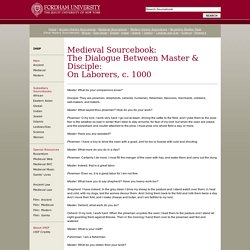
Disciple: They are plowmen, shepherds, oxherds, huntsmen, fishermen, falconers, merchants, cobblers, salt-makers, and bakers. Master: What sayest thou plowman? How do you do your work? Plowman: O my lord, I work very hard: I go out at dawn, driving the cattle to the field, and I yoke them to the plow. Nor is the weather so bad in winter that I dare to stay at home, for fear of my lord: but when the oxen are yoked, and the plowshare and coulter attached to the plow, I must plow one whole field a day, or more.
Master: Have you any assistant? Plowman: I have a boy to drive the oxen with a goad, and he too is hoarse with cold and shouting. Master: What more do you do in a day? Plowman: Certainly I do more. Master: Indeed, that is a great labor. World History. Western Civilization II » Blog Archive » Religious Maps of Europe. By lstraton ~ January 26th, 2010. Filed under: Chapter 13: Reformation, Religious Wars, and National Conflicts. I found some cool maps that show the impact of the reformation. This is a map of pre-reformation Europe.
This is a map of 1520′s Europe. Finally, this is a map of modern day Europe. As a side note, I thought it was interesting that France starts out as all Catholic then has some Calvinist parts then goes back to being all Catholic. ~Hannah (Libby) Straton.
Primary Sources with Document-based Questions. • Macartney and the Emperor The Qing dynasty's restrictions on foreign trade increasingly frustrated Europeans, especially the British.
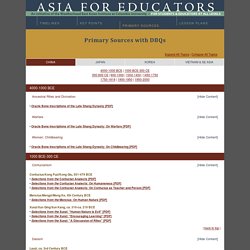
In 1792 Great Britain sent a diplomat, Lord George Macartney (1737-1806), to present its demands to the Qianlong emperor (r. 1736-1796). This unit includes an introductory note to teachers with suggestions for teaching about Macartney's mission; a student reading discussing European contact and trade with China prior to and on the eve of Macartney's mission to China; and the primary-source reading Two Edicts from the Qianlong Emperor, which were the Qianlong emperor's responses to the Macartney mission.
With discussion questions and suggested activities for students. • The Opium War and Foreign Encroachment In the fifty years after Macartney's visit (see "Macartney and the Emperor," above), Western powers pushed their demands on China further, leading to war and the gradual shift from tribute to treaty relations. Historical globes. What's Next? The genesis of a Chinese factory town is always the same: In the beginning nearly everybody is a construction worker.
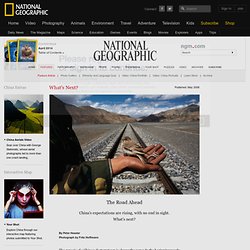
The booming economy means that work moves fast, and new industrial districts rise in distinct stages. Those early laborers are men who have migrated from rural villages, and immediately they're joined by small entrepreneurs. These pioneers sell meat, fruit, and vegetables on informal stands, and later, when the first real stores appear, they stock construction materials. After that cell phone companies set up shop: China Mobile, China Unicom. They deal prepaid phone cards to migrants; in the southeastern province of Zhejiang, one popular product is called the Homesick Card. Middle Eastern Countries - Level L Online Learning. Middle Eastern Bodies of Water - Level L Online Learning.
Global Connections . Oil Crisis: What Would You Do? Lesson Plan Part 1 Read or provide printed copies of the following scenario to students: Hypothetical Scenario: It is May 2004 -- the beginning of the summer travel season in the United States.
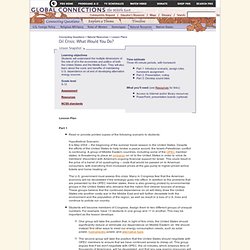
Despite the efforts of the United States to help broker a peace accord, the Israeli-Palestinian conflict is continuing. A group of Middle Eastern countries, including some of the OPEC member states, is threatening to place an embargo on oil to the United States in order to voice its members' discontent with America's ongoing financial support for Israel. This could result in the price of a barrel of oil quadrupling -- costs that would be passed on to American consumers, with everything from increased prices at the gas pump to higher-priced airline tickets and home heating oil. Part 2 After each group has developed its own proposal, they will present their arguments in a Congressional debate, leading to a vote on the issue of how to resolve this conflict with OPEC.
Part 3 Assessment Resources. Modern World History Lesson Plans for High School. Modern China - Classroom Companion. This companion document to the Issue in Focus provides educators with guidance to incorporate the content into classroom teaching.
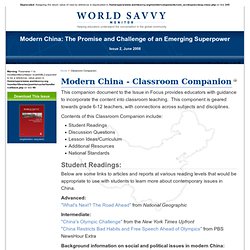
This component is geared towards grade 6-12 teachers, with connections across subjects and disciplines. Contents of this Classroom Companion include: Student Readings Discussion Questions Lesson Ideas/Curriculum Additional Resources National Standards Student Readings: Below are some links to articles and reports at various reading levels that would be appropriate to use with students to learn more about contemporary issues in China. Advanced: "What's Next?
Intermediate: "China's Olympic Challenge" from the New York Times Upfront"China Restricts Bad Habits and Free Speech Ahead of Olympics" from PBS NewsHour Extra Background information on social and political issues in modern China:"China Guide" from OneWorld.net Student Voice:"Returning to China" from PBS NewsHour Extra Possible Discussion Questions:
Teachers — Resources For The Classroom. EuroDocs.